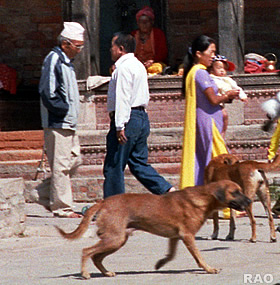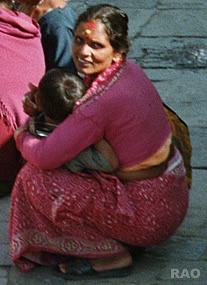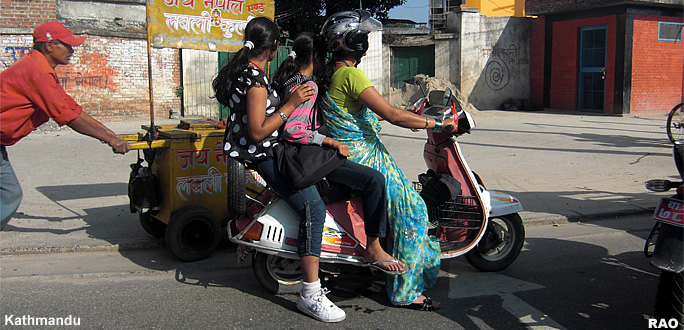 |
| Social Status of Women |
|
|
|
|
|
 |
|
|

|
| Domestic violence still common |
KATHMANDU, 25 November 2008 (IRIN)
Thousands of women are subjected to domestic violence each year. Thousands of women are subjected to domestic violence each year.
Married at the age of 12, Radha Neupane has been a victim of domestic violence for two decades.
"I'm used to it now. What choice do I have?" asked Neupane who works as a maid in more than three houses, earning less than US$30 per month, to support her children.
She gets absolutely no support from her alcoholic husband.
"I have to survive for my children. They will be homeless if I leave my husband," the 32-year old told IRIN in Kathmandu, where incidents of domestic violence often go unreported.
Despite campaigns against gender-based violence over several decades, beating, slapping, kicking, hair-pulling, verbal abuse, as well as the use of sticks, knives and acid remain common forms of domestic violence in Nepal, experts say.
"The situation has barely changed because we have the same patriarchal society where women's equality is not accepted," activist Bhawana Rana, vice-president of Saathi, a national NGO helping victims of domestic violence, said.
According to Saathi, which has been lobbying the government to bring in laws against domestic violence, Nepal has one of the worst records of gender-based violence in Asia.
Lobbying for change
"Cases of domestic violence and related impunity are increasing, especially due to the lack of strong laws penalising the guilty."
 |
 |
|
The 2002 bill on "Domestic Violence (Crime and Punishment)" remains on hold.
"Cases of domestic violence and related impunity are increasing, especially due to the lack of strong laws penalising the guilty," said advocate Shanta Sedai.
Activists are calling for major changes in social attitudes: "We also have the challenge of eliminating social taboos and superstitions against women," explained Rana from Saathi.
Rights NGOs say a number of crimes like polygamy, marital rape, sexual abuse by relatives, torture and even trafficking, are directly related to domestic violence.
According to UN Population Fund (UNFPA), the main challenge is that domestic violence is seen as a private family affair, with outside intervention not encouraged. There is also wide social approval among men and women of gender-based violence, activists say.
A 2001 survey by the government's national level Nepal Demographic and Health Survey said a large number of women - including those in urban areas - thought it was acceptable for a husband to beat his wife for burning food, arguing, going outdoors without permission, or refusing to have sex.
 |
"Discriminatory institutions"
"In our patriarchal society, traditionally defined patterns of social roles and responsibilities have led to a system of discriminatory institutions resulting in gender-based violence," Peden Pradhan, assistant representative of UNFPA Nepal, told IRIN.
Meanwhile, activists remain concerned that failure to seriously eliminate such violence will only encourage impunity among the perpetrators. Even pregnant women have not been spared severe physical violence, said Samanta, another local women's rights NGO.
According to UNFPA's study entitled Gender Equality and Empowerment of Women in Nepal, abused women are more likely to suffer from depression, anxiety, psychosomatic symptoms, sexual dysfunction and many reproductive health problems.
| Credit
IRIN 2008 Copyright Ⓒ UN Office for the Coordination of Humanitarian Affairs 2008 [ This report does not necessarily reflect the views of the United Nations] Integrated Regional Information Networks (IRIN), part of the UN Office for the Coordination of Humanitarian Affairs (OCHA). |
| IRIN News |
|
IRIN News |

|
|||
|
|||
|
|
 |
| more information |
|
|
|
 |
|
|